

The most important thing. "I made it my mission..." Why don't authors compete? There's an apocryphal story of a guy who went for his final interview for a senior post at Coca-Cola.
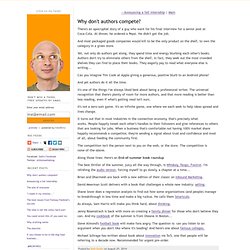
At dinner, he ordered a Pepsi. He didn't get the job. And most packaged goods companies would kill to be the only product on the shelf, to own the category in a given store. Yet, not only do authors get along, they spend time and energy blurbing each other's books. Authors don't try to eliminate others from the shelf, in fact, they seek out the most crowded shelves they can find to place their books. Can you imagine Tim Cook at Apple giving a generous, positive blurb to an Android phone? And yet authors do it all the time. It's one of the things I've always liked best about being a professional writer. It's not a zero-sum game. It turns out that in most industries in the connection economy, that's precisely what works.
The competition isn't the person next to you on the web, or the store. Along those lines: Here's an End-of-summer book roundup. Turning passion on its head. Forgive yourself. The wasteful fraud of sorting for youth meritocracy. "Sorry, you didn't make the team.
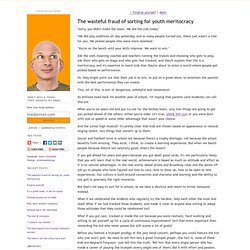
We did the cuts today. " "We did play auditions all day yesterday, and so many people turned out, there just wasn't a role for you. We picked people who were more talented. " "You're on the bench until your skills improve. We want to win. " Ask the well-meaning coaches and teachers running the tryouts and choosing who gets to play, ask them who gets on stage and who gets fast tracked, and they'll explain that life is a meritocracy, and it's essential to teach kids that they're about to enter a world where people get picked based on performance. Or, they might point out that their job is to win, to put on a great show, to entertain the parents with the best performance they can create. This, all of this, is sort of dangerous, unhelpful and nonsensical.
As millions head back for another year of school, I'm hoping that parents (and students) can call this out. And the junior high musical? We're not spending nearly enough time asking each other: What is School For? Crucial elements for the placebo effect. Placebos, used ethically, are powerful tools.
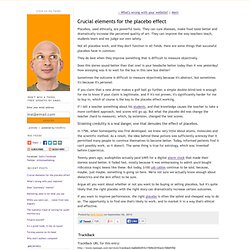
They can cure diseases, make food taste better and dramatically increase the perceived quality of art. They can improve the way teachers teach, students learn and we judge our own safety. Not all placebos work, and they don't function in all fields. Here are some things that successful placebos have in common: They do best when they improve something that is difficult to measure objectively. The launch meeting. You've probably been to one.
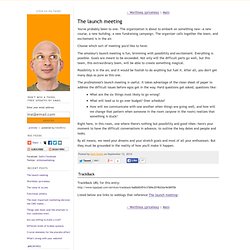
The organization is about to embark on something new--a new course, a new building, a new fundraising campaign. The organizer calls together the team, and excitement is in the air. Choose which sort of meeting you'd like to have: Are you willing to build a trail? A few years ago, I posted a help-wanted ad.

I was recently looking at some of the application questions: Point to your personal website Show us some of the projects you’ve led that have shipped and made an impact Show us work you’ve done on the clock, and how you made it work Are you restless? Find a particularly lame example of UX on the web and fix it into something better than good What’s the best lesson you’ve learned from Steve Krug or Steve McConnell? Point to a blog post that changed the way you think about connecting with people online Have you created anything worth watching on Vimeo or YouTube? Tribes and their perceived threats.
Intermarriage has always been a problem, all the way back to Romeo and Juliet (and West Side Story, of course).

Intermarriage de-demonizes the ‘other’, and the insecure tribe member sees this as an existential threat, the beginning of the end of tribal cohesion. Gangs in LA view high school as a threat. Understanding substitutes. This is a pretty long post, and I know that you could easily substitute another round of Angry Birds instead of reading it.
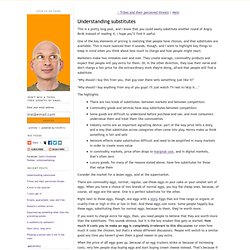
I hope you’ll find it useful. One of the key elements of pricing is realizing that people have choices, and that substitutes are available. This is more nuanced than it sounds, though, and I want to highlight key things to keep in mind when you think about how much to charge and how people might react. Marketers make two mistakes over and over. They create average, commodity products and expect that people will pay extra for them. "Why should I buy this from you, that guy over there sells something just like it? " "Why should I buy anything from any of you guys? The highlights: Consider the market for a dozen eggs, sold at the supermarket. There are commodity eggs, normal, regular, use-these-eggs-in-your-cake-or-your-omelet sort of eggs. Short term, long term.